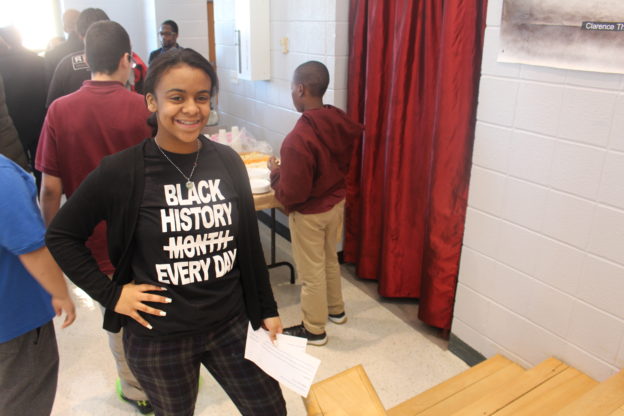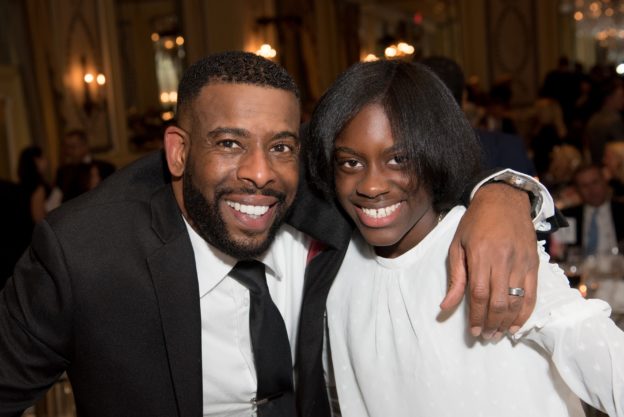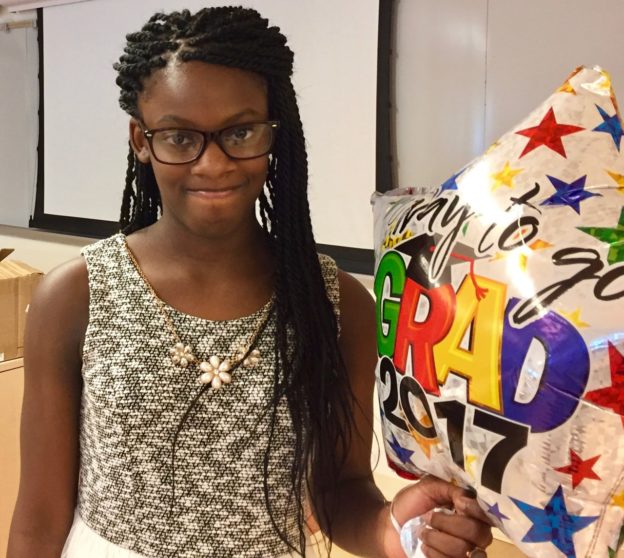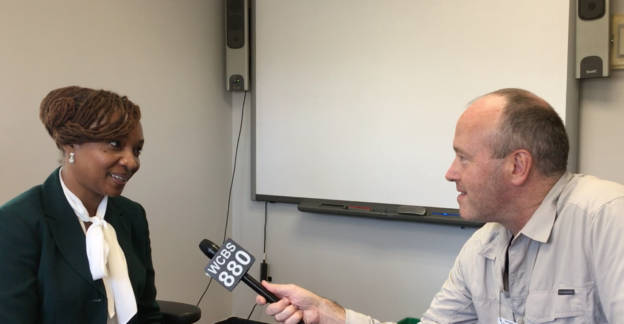Ever wonder what it is like to successfully foster a child? Here’s a chance to find out. In an extensive interview with Sean Adams, a reporter with WCBS News Radio 880, Michelle Allen, a devoted Leake & Watts foster parent, talks about the challenges and joy that comes from giving children a haven while our foster care program simultaneously helps the children’s birth parents with parenting training and other supports they need so the children can return safely to their home.
Sean Adams found Michelle’s story so compelling that the radio station has dubbed her one of its “50 People to Know in New York,” a list of 50 exceptional New Yorkers they’ve compiled to mark their 50th year of broadcasting as a news station.
It’s the second honor Michelle has received this year. The Administration for Children’s Services (ACS) recognized Michelle as an “Outstanding Foster Parent” during National Foster Care Month in May. A retired executive secretary from the Bronx, Michelle has been opening her heart and home to teenage girls, including teenage mothers with children for several years now. With Michelle, they learn how to trust again after living through trauma, instability, and broken promises.
In the radio interview, Michelle explains how she develops a bond with the girls. “I make my home as comfortable and welcoming as possible…They end up opening up to me because I have some stories of my own to tell,” she says.
The full interview is posted on the WCBS website along with a transcript of the shorter radio report that aired.
It Began with Her Granddaughters
Michelle tells her interesting story in the interview. She became part of Leake & Watts’s foster care program several years ago, when she took in her granddaughters. “It was an unfortunate situation in which they were left alone, and they were rescued by ACS and Leake & Watts. That’s what I call it,” she says. “They were saved.”
For two years, the girls lived with Michelle. Then the happy day came when their mother was able to welcome them home again. “Life was great,” says Michelle. Still, after a while, she sensed something she had never sensed before. “Prior to the girls coming to my house, I was alone then, but I didn’t feel lonely,” says Michelle, a single mom whose son is grown. ”But when [the girls] left me, suddenly, I felt so lonely.”
Michelle decided to open her home to other foster children. She chooses to work with high-need teenage girls. As anyone who has children in their teens knows, it is a difficult age. But Michelle is up to the challenge.
“It takes time, but in my home, it doesn’t take long at all. Immediately after coming into my home, we begin cooking together. I have all sorts of games. I have a fitness center in my home. I have a garden directly across the street…we pick cucumbers, tomatoes, and sunflowers.” The girls have a chance to plant their own flowers and vegetables.
The girls remain skittish for a while. “I can see they are happy, but they are still withdrawn,” Michelle says. “They’ve been moving from home to home, not knowing if this home is going to be a ‘keeper.’ They think, ’She’s being nice and in one month I’m going to be removed from her.” Her approach is to let them warm up to her. “I just try to be myself, show them as much loves as possible.”
Something else helps. Michelle always calls each girl “my daughter” when she introduces them to friends, family, and church members. “I look to see how they react to that, and they draw a little bit closer to me. I’ve had some wrap their arm right in mine, like, this is a good mom and I’m proud she is saying I’m her daughter,” she says.
Never Ask Why
One thing Michelle doesn’t do is ask the children why they are in foster care. “Some of the reasons they never, ever want to talk about again,” she says. “I just allow them to attach themselves to me, so they do. Once we become more comfortable with one another, without asking, they volunteer [to tell] the reason that brought them into foster care.”
Because family reunification is the goal, Michelle builds a relationship with the birth parents, and has lunch and dinner with them. She says it is important that when the girls leave her home that they have rebuilt their relationship with their families. She urges the children to have “a forgiving heart, whatever the circumstances. I say, ‘Don’t hold your parents at fault. It was at a time when they weren’t in their right minds themselves, or due to the situation, they were just not able to raise you properly.”
She also teaches the children, “Anything you want to do, you can accomplish. Do not be discouraged. Life will throw obstacles at you from all directions, 24/7. Stay focused and you can become whomever you want to be because you are talented girls,” she says. She helps them develop that talent by making school a priority—two of her daughters are currently in college. She also uses her business network to help them find summer jobs.
Michelle says that fostering children “is what I want to do the rest of my life.” For that, she is richly rewarded.
“It makes me feel rich, it makes me feel very important that I’m doing something good for someone other than myself or my immediate family members,” she says at the end of her interview. ”Giving, loving, sharing is the most gratifying thing in the world to me.”
If you would like to learn about fostering a child or attend one of our informational meetings, please visit leakeandwatts.org/program/foster-care-programs.





